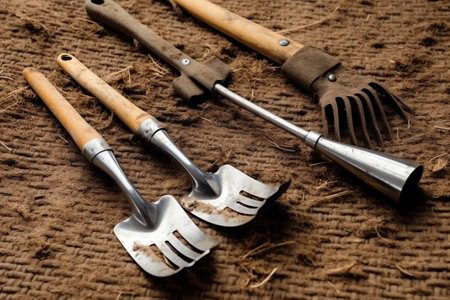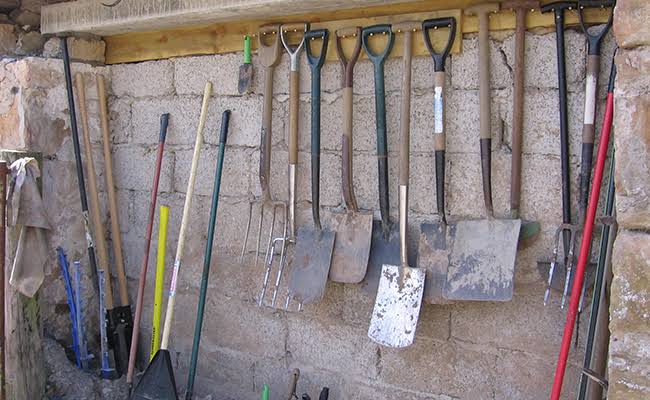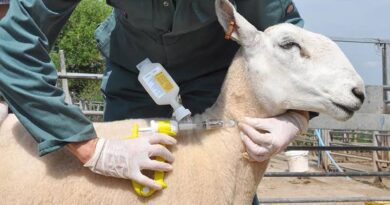Importance and Types of Farm Tools
Farm tools play a crucial role in agriculture, aiding farmers in various tasks essential for crop cultivation and livestock management. These tools, designed for efficiency and durability, contribute significantly to the success of farming endeavors.
Among the essential farm tools are plows, which are used to turn and break the soil for planting. Plowing helps in aerating the soil and creating a suitable seedbed. Farmers rely on different types of plows, such as moldboard plows and disc plows, depending on their specific needs and the type of soil they are working with.
Another indispensable tool is the hoe, a simple yet effective implement for cultivating the soil, removing weeds, and creating furrows for planting. Hoes come in various shapes and sizes, each serving a specific purpose in the farming process. Their versatility makes them a valuable asset for farmers engaged in both small-scale and large-scale agriculture.
Seed drills are advanced tools that have revolutionized the planting process. These machines precisely place seeds at predetermined intervals, ensuring optimal spacing for growth. This not only saves time but also improves crop yield by promoting uniformity in plant distribution.
Farmers also rely on harvesters to efficiently gather crops when they reach maturity. Whether it’s a combine harvester for grains or a cotton picker for cotton fields, these machines streamline the harvesting process, significantly reducing manual labor and increasing overall productivity.
In livestock management, tools like milking machines have modernized the dairy industry. These devices automate the milking process, making it more efficient and hygienic. Livestock farmers also use shears for shearing wool from sheep, contributing to the textile industry and ensuring the well-being of the animals.
Tractors, a cornerstone of modern agriculture, serve a multitude of purposes on the farm. From plowing and planting to transporting goods, tractors are versatile machines that have transformed the way farmers approach their work. Equipped with various attachments, tractors can handle different tasks throughout the farming season.
In pest control, sprayers and dusters play a crucial role in protecting crops from harmful insects and diseases. These tools allow farmers to apply pesticides and fertilizers evenly, ensuring the health and vitality of their crops.
Farm tools are the backbone of agriculture, empowering farmers to work efficiently and sustainably. From the humble hoe to sophisticated tractors and harvesters, each tool has a specific role in the farming process, contributing to the overall success of agricultural practices worldwide.
The evolution of farm tools has not only increased productivity but has also brought about significant improvements in sustainability and resource management. Precision farming technologies, integrated with modern farm machinery, enable farmers to make data-driven decisions, optimizing resource usage and minimizing environmental impact.
One noteworthy advancement is the adoption of GPS technology in tractors and other equipment. This allows for precise navigation and field mapping, ensuring that farmers can manage their resources more effectively. By minimizing overlap in activities like planting and fertilizing, farmers not only save time and resources but also contribute to a more eco-friendly approach to agriculture.
Furthermore, the development of automated and robotic systems has further transformed the farming landscape. Drones equipped with sensors provide real-time data on crop health, allowing farmers to identify potential issues early and take corrective action. Automated machinery, such as robotic weeders, can precisely target and eliminate weeds, reducing the reliance on chemical herbicides.
The integration of renewable energy sources into farm equipment is another positive trend. Solar-powered irrigation systems, for instance, offer a sustainable solution for water management, especially in areas with limited access to traditional power sources. This not only reduces the environmental impact but also lowers operating costs for farmers.
Adapting to climate change challenges, some farm tools now come equipped with climate-monitoring features. This enables farmers to adjust their practices based on changing weather patterns, ensuring resilience in the face of unpredictable conditions. It also contributes to the overall goal of sustainable and climate-smart agriculture.
Farmers, with access to a diverse range of tools, are better equipped to address global challenges like food security and environmental sustainability. The continuous innovation in farm tools reflects a commitment to improving efficiency, reducing waste, and promoting responsible stewardship of the land.
The story of farm tools is one of constant innovation and adaptation. From the manual implements of the past to the sophisticated, technology-driven machinery of today, these tools have not only shaped the way we farm but also played a pivotal role in supporting the growing global population. As agriculture continues to evolve, so too will the tools that drive its progress, ensuring a sustainable and prosperous future for farmers and consumers alike.
Read Also: All You Need To Know About Panic Grass (Dichanthelium Spp)
Importance of Farm Tools

The importance of farm tools in agriculture cannot be overstated, as these implements are fundamental to the success and sustainability of farming practices.
1. Efficiency and Productivity: Farm tools significantly enhance the efficiency and productivity of agricultural activities. Mechanized tools, such as tractors and harvesters, allow farmers to cover larger areas in less time compared to manual labor. This efficiency is crucial for meeting the demands of a growing global population.
2. Precision Farming: The advent of precision farming technologies integrated into farm tools has revolutionized agriculture. GPS-guided tractors and drones equipped with sensors enable precise navigation and data collection. This level of precision not only maximizes resource utilization but also minimizes environmental impact by reducing the overuse of water, fertilizers, and pesticides.
3. Labour Savings: Mechanized farm tools alleviate the physical burden on farmers and reduce the dependency on manual labor. This is especially significant as it addresses labor shortages in many agricultural regions. The time saved can be redirected to other essential tasks, contributing to overall farm management.
4. Crop Health and Quality: Tools like seed drills and precision planters ensure proper seed placement, leading to uniform plant growth. This not only increases yield but also improves the overall quality of the harvested crops. Additionally, tools for pest control, such as sprayers, help protect crops from diseases and pests, ensuring a healthier harvest.
5. Sustainability: Modern farm tools play a crucial role in sustainable agriculture. Solar-powered irrigation systems, for instance, reduce reliance on non-renewable energy sources and contribute to environmentally friendly farming practices. Automated technologies and robotics aid in precision application of inputs, minimizing waste and environmental impact.
6. Adaptation to Climate Change: Farm tools equipped with climate-monitoring features assist farmers in adapting to changing weather patterns. This adaptability is essential in the face of climate change challenges, allowing farmers to make informed decisions and mitigate potential risks to their crops.
The importance of farm tools in agriculture extends beyond mere convenience. These tools are integral to the economic viability of farms, the livelihoods of farmers, and the global effort to ensure food security and environmental sustainability. As technology continues to advance, the role of farm tools will likely become even more critical in addressing the evolving challenges of the agricultural sector.
Read Also: A Guide to Growing and Caring for Dichondra Grass (Dichondra Repens)
Types of Farm Tools

Farm tools encompass a diverse range of implements designed to meet the various needs of agriculture. Here are some common types of farm tools, each serving a specific purpose in the cultivation and management of crops and livestock:
1. Plows: Used for breaking and turning soil, plows come in different types, such as moldboard plows, disc plows, and chisel plows. They prepare the soil for planting by loosening and turning it.
2. Hoes: Manual tools for cultivating the soil, removing weeds, and creating furrows for planting. Hoes are available in various shapes and sizes, each serving a specific function in farm work.
3. Seed Drills: Precision planting tools that ensure accurate spacing and depth when sowing seeds. They contribute to uniform crop emergence and efficient use of seeds.
4. Tractors: Versatile machines used for various tasks, including plowing, planting, and transporting goods. Tractors can be equipped with different attachments for different purposes.
5. Harvesters: Machines designed to efficiently gather mature crops. Examples include combine harvesters for grains and cotton pickers for cotton fields.
6. Milking Machines: Automated devices used in dairy farming to extract milk from cows. They improve efficiency and hygiene in the milking process.
7. Shears: Tools for shearing wool from sheep in the livestock industry. Shearing is essential for both the well-being of the animals and the production of wool.
8. Sprayers and Dusters: Tools for applying pesticides, herbicides, and fertilizers to crops. They help control pests and diseases while ensuring even distribution of inputs.
9. Irrigation Systems: Tools for delivering water to crops systematically. This includes drip irrigation, sprinkler systems, and furrow irrigation, depending on the farm’s needs.
10. Hand Tools: Various manual implements such as shovels, rakes, and pruners that aid in smaller-scale tasks and precision work.
11. Livestock Handling Equipment: This includes items like cattle chutes, sorting gates, and headlocks, which assist in the management and care of livestock.
12. Climate Monitoring Tools: Modern tools equipped with sensors to monitor weather conditions, helping farmers make informed decisions based on real-time data.
These types of farm tools collectively contribute to the efficiency, productivity, and sustainability of agriculture, showcasing the diversity and specialization required in modern farming practices.
Choosing the Best Farm Tools
Choosing the best farm tools is crucial for ensuring efficiency, productivity, and overall success in agriculture. Here are some considerations to help you make informed decisions when selecting farm tools:
1. Identify Your Farming Needs: Assess the specific tasks and operations on your farm. Different tools cater to various aspects of farming, such as plowing, planting, harvesting, or livestock management.
2. Understand Your Soil and Terrain: Consider the type of soil and the terrain of your farm. Some tools may be better suited for particular soil types or landscapes. For instance, certain plows work better in sandy soils, while others are designed for heavy clay.
3. Evaluate Scale and Size of Operations: The scale of your farming operations matters. Small-scale farms may require different tools than large-scale commercial farms. Choose tools that align with the size of your operation to maximize efficiency.
4. Consider Precision and Technology: Modern farming involves precision agriculture. Evaluate tools with technological features like GPS guidance for tractors, automated seed drills, or sensors for climate monitoring. These technologies can enhance accuracy and productivity.
5. Factor in Budget Constraints: Establish a realistic budget for your farm tools. While advanced machinery may offer benefits, it’s essential to balance features with affordability. Consider the long-term return on investment for each tool.
6. Assess Maintenance Requirements: Evaluate the maintenance needs of the tools. Opt for tools that are durable, easy to maintain, and have good availability of spare parts. Regular maintenance ensures the longevity and reliability of the equipment.
7. Seek Recommendations and Reviews: Consult experienced farmers and agricultural experts for recommendations. Online reviews and testimonials can provide insights into the performance and reliability of specific tools.
8. Compatibility of Attachments: If you are investing in equipment like tractors, consider the availability and compatibility of attachments. A versatile machine with various attachments can serve multiple purposes on the farm.
9. Test Before Purchase: Whenever possible, test the tools before making a purchase. This hands-on approach allows you to assess how well the tool performs in your specific farming conditions.
10. Environmental Impact: Consider the environmental impact of the tools. Opt for equipment that promotes sustainable farming practices, such as reduced chemical usage, energy efficiency, and minimal soil disturbance.
11. Warranty and Customer Support: Check the warranty and customer support provided by the manufacturer. A good warranty reflects the confidence of the manufacturer in their product, and reliable customer support ensures assistance in case of issues.
By carefully considering these factors, you can make informed decisions when choosing farm tools that align with the unique requirements and goals of your agricultural operation.
Read Also: Wonderful DIY Ideas and Projects: Unleashing Your Creativity









